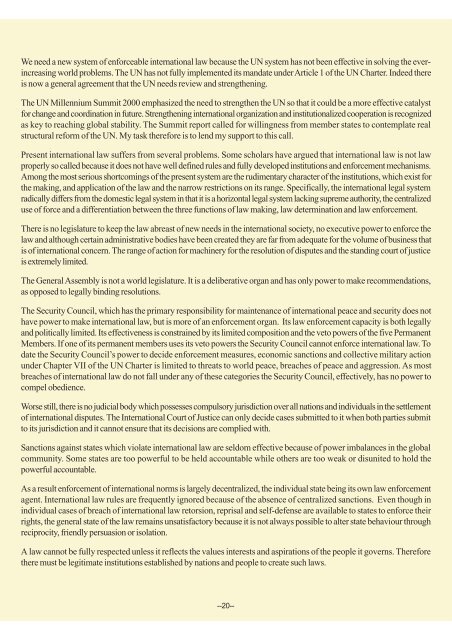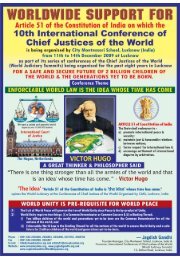Download the Speeches of all Hon'ble Chief Justices & Judges in ...
Download the Speeches of all Hon'ble Chief Justices & Judges in ...
Download the Speeches of all Hon'ble Chief Justices & Judges in ...
You also want an ePaper? Increase the reach of your titles
YUMPU automatically turns print PDFs into web optimized ePapers that Google loves.
We need a new system <strong>of</strong> enforceable <strong>in</strong>ternational law because <strong>the</strong> UN system has not been effective <strong>in</strong> solv<strong>in</strong>g <strong>the</strong> ever<strong>in</strong>creas<strong>in</strong>gworld problems. The UN has not fully implemented its mandate under Article 1 <strong>of</strong> <strong>the</strong> UN Charter. Indeed <strong>the</strong>reis now a general agreement that <strong>the</strong> UN needs review and streng<strong>the</strong>n<strong>in</strong>g.The UN Millennium Summit 2000 emphasized <strong>the</strong> need to streng<strong>the</strong>n <strong>the</strong> UN so that it could be a more effective catalystfor change and coord<strong>in</strong>ation <strong>in</strong> future. Streng<strong>the</strong>n<strong>in</strong>g <strong>in</strong>ternational organization and <strong>in</strong>stitutionalized cooperation is recognizedas key to reach<strong>in</strong>g global stability. The Summit report c<strong>all</strong>ed for will<strong>in</strong>gness from member states to contemplate realstructural reform <strong>of</strong> <strong>the</strong> UN. My task <strong>the</strong>refore is to lend my support to this c<strong>all</strong>.Present <strong>in</strong>ternational law suffers from several problems. Some scholars have argued that <strong>in</strong>ternational law is not lawproperly so c<strong>all</strong>ed because it does not have well def<strong>in</strong>ed rules and fully developed <strong>in</strong>stitutions and enforcement mechanisms.Among <strong>the</strong> most serious shortcom<strong>in</strong>gs <strong>of</strong> <strong>the</strong> present system are <strong>the</strong> rudimentary character <strong>of</strong> <strong>the</strong> <strong>in</strong>stitutions, which exist for<strong>the</strong> mak<strong>in</strong>g, and application <strong>of</strong> <strong>the</strong> law and <strong>the</strong> narrow restrictions on its range. Specific<strong>all</strong>y, <strong>the</strong> <strong>in</strong>ternational legal systemradic<strong>all</strong>y differs from <strong>the</strong> domestic legal system <strong>in</strong> that it is a horizontal legal system lack<strong>in</strong>g supreme authority, <strong>the</strong> centralizeduse <strong>of</strong> force and a differentiation between <strong>the</strong> three functions <strong>of</strong> law mak<strong>in</strong>g, law determ<strong>in</strong>ation and law enforcement.There is no legislature to keep <strong>the</strong> law abreast <strong>of</strong> new needs <strong>in</strong> <strong>the</strong> <strong>in</strong>ternational society, no executive power to enforce <strong>the</strong>law and although certa<strong>in</strong> adm<strong>in</strong>istrative bodies have been created <strong>the</strong>y are far from adequate for <strong>the</strong> volume <strong>of</strong> bus<strong>in</strong>ess thatis <strong>of</strong> <strong>in</strong>ternational concern. The range <strong>of</strong> action for mach<strong>in</strong>ery for <strong>the</strong> resolution <strong>of</strong> disputes and <strong>the</strong> stand<strong>in</strong>g court <strong>of</strong> justiceis extremely limited.The General Assembly is not a world legislature. It is a deliberative organ and has only power to make recommendations,as opposed to leg<strong>all</strong>y b<strong>in</strong>d<strong>in</strong>g resolutions.The Security Council, which has <strong>the</strong> primary responsibility for ma<strong>in</strong>tenance <strong>of</strong> <strong>in</strong>ternational peace and security does nothave power to make <strong>in</strong>ternational law, but is more <strong>of</strong> an enforcement organ. Its law enforcement capacity is both leg<strong>all</strong>yand politic<strong>all</strong>y limited. Its effectiveness is constra<strong>in</strong>ed by its limited composition and <strong>the</strong> veto powers <strong>of</strong> <strong>the</strong> five PermanentMembers. If one <strong>of</strong> its permanent members uses its veto powers <strong>the</strong> Security Council cannot enforce <strong>in</strong>ternational law. Todate <strong>the</strong> Security Council’s power to decide enforcement measures, economic sanctions and collective military actionunder Chapter VII <strong>of</strong> <strong>the</strong> UN Charter is limited to threats to world peace, breaches <strong>of</strong> peace and aggression. As mostbreaches <strong>of</strong> <strong>in</strong>ternational law do not f<strong>all</strong> under any <strong>of</strong> <strong>the</strong>se categories <strong>the</strong> Security Council, effectively, has no power tocompel obedience.Worse still, <strong>the</strong>re is no judicial body which possesses compulsory jurisdiction over <strong>all</strong> nations and <strong>in</strong>dividuals <strong>in</strong> <strong>the</strong> settlement<strong>of</strong> <strong>in</strong>ternational disputes. The International Court <strong>of</strong> Justice can only decide cases submitted to it when both parties submitto its jurisdiction and it cannot ensure that its decisions are complied with.Sanctions aga<strong>in</strong>st states which violate <strong>in</strong>ternational law are seldom effective because <strong>of</strong> power imbalances <strong>in</strong> <strong>the</strong> globalcommunity. Some states are too powerful to be held accountable while o<strong>the</strong>rs are too weak or disunited to hold <strong>the</strong>powerful accountable.As a result enforcement <strong>of</strong> <strong>in</strong>ternational norms is largely decentralized, <strong>the</strong> <strong>in</strong>dividual state be<strong>in</strong>g its own law enforcementagent. International law rules are frequently ignored because <strong>of</strong> <strong>the</strong> absence <strong>of</strong> centralized sanctions. Even though <strong>in</strong><strong>in</strong>dividual cases <strong>of</strong> breach <strong>of</strong> <strong>in</strong>ternational law retorsion, reprisal and self-defense are available to states to enforce <strong>the</strong>irrights, <strong>the</strong> general state <strong>of</strong> <strong>the</strong> law rema<strong>in</strong>s unsatisfactory because it is not always possible to alter state behaviour throughreciprocity, friendly persuasion or isolation.A law cannot be fully respected unless it reflects <strong>the</strong> values <strong>in</strong>terests and aspirations <strong>of</strong> <strong>the</strong> people it governs. Therefore<strong>the</strong>re must be legitimate <strong>in</strong>stitutions established by nations and people to create such laws.--20--
















